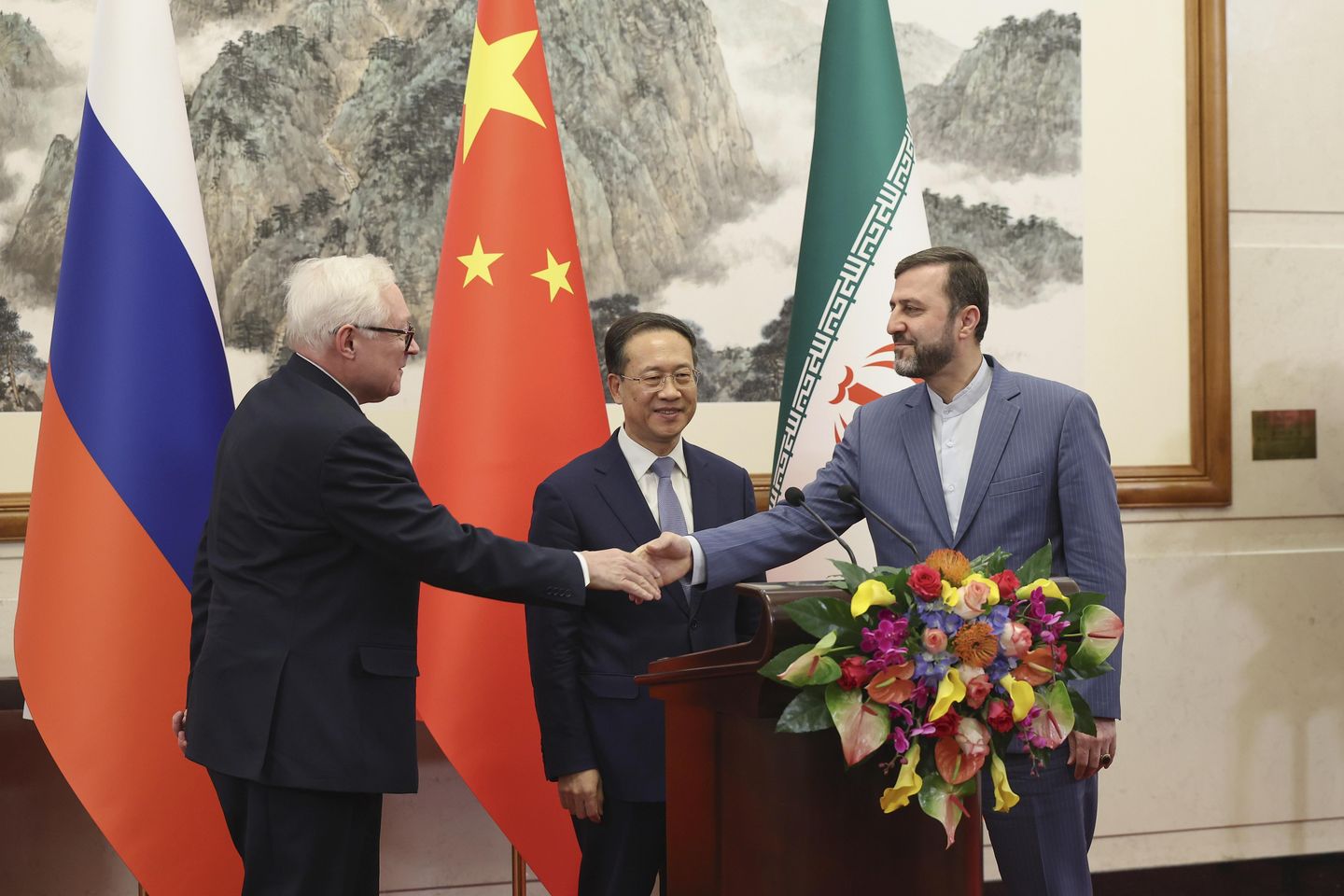
Iran appears to be getting little beyond rhetoric in terms of immediate, tangible support from its proxy network across the Middle East or from its authoritarian allies abroad on the heels of major U.S. airstrikes that crippled Tehran’s nuclear program.
In fact, the Trump administration appeared eager Sunday to use the U.S.-Iran confrontation — and specifically the possibility that Iran could retaliate economically by shutting down the vital Strait of Hormuz waterway — as a way to divide Tehran from some of its global partners, particularly China.
Secretary of State Marco Rubio publicly urged China to use its influence to pressure Iran to keep open the passage, arguing that a blockade by Tehran would harm all global commerce, including that of China. At least 20% of all the world’s oil consumption passes through the Strait each day.
While China and Iran, along with Russia, North Korea and occasionally Venezuela, are typically grouped together in what many analysts call the “Axis of Authoritarians,” there’s some degree of uncertainty about China’s true positions and whether it privately may have been at least tacitly supportive of the idea of taking Tehran’s nuclear ambitions off the table.
There were no indications Sunday that the Trump administration gave either China or Russia, another key Iranian ally, any advance notice about the American strikes. The Times of Israel, citing an unnamed government official, reported that Israeli Prime Minister Benjamin Netanyahu knew about the attacks “at least 24 hours before.”
Mr. Rubio used appearances on several Sunday morning television programs to appeal to China’s self-interest in its dealing with the embattled regime in Tehran and the threat to Gulf shipping.
“I would encourage the Chinese government in Beijing to call them about that, because they heavily depend on the Straits of Hormuz for their oil. If they do that, it’ll be another terrible mistake. It’s economic suicide for them if they do it,” he told Fox Business’ “Sunday Morning Futures” program. “And we retain options to deal with that. But other countries should be looking at that as well. It would hurt other countries’ economies a lot worse than ours. It would be, I think, a massive escalation that would merit a response not just by us but from others.”
The Chinese Foreign Ministry condemned the U.S. airstrikes on the Iranian nuclear facilities at Fordo, Natanz and Isfahan and called them a violation of international law.
“China is willing to work with the international community to pool efforts together and uphold justice, and contribute to the work for restoring peace and stability in the Middle East,” the ministry said in its statement.
The Russian Foreign Ministry issued an equally blistering statement, calling the U.S. strikes “a gross violation of international law, the U.N. Charter, and U.N. Security Council resolutions.”
Iranian Foreign Minister Abbas Araghchi was reportedly scheduled to travel to Moscow on Sunday to meet with Russian President Vladimir Putin and other key officials.
“We enjoy a strategic partnership and we always consult with each other and coordinate our positions,” Mr. Araghchi said during a press availability in Turkey, before traveling to Russia.
Russia and Iran have become much closer in recent years, especially as Tehran has provided Russia with drones and other equipment for Moscow’s war in Ukraine.
Dmitry Medvedev, the deputy head of the Kremlin’s Security Council, issued one of the more bewildering statements Sunday.
“A number of countries are ready to directly supply Iran with their own nuclear warheads,” he wrote on X, offering no evidence or detail on which countries would give Tehran nuclear arms, or why.
There was no immediate comment from North Korea on the U.S. airstrikes.
The government of Venezuela, another Iranian ally, called the attacks “illegal, unjustifiable and extremely dangerous.”
Qatar, home to Al Udeid Air Base, the largest U.S. base in the region, urged all sides to “avoid escalation, which the peoples of the region, burdened by conflicts and their tragic humanitarian repercussions, cannot tolerate.”
But Iran’s more immediate concerns may be with the action, or inaction, of its “axis of resistance,” its network of proxies across the Mideast. Lebanon-based Hezbollah, a key part of that axis, was devastated by an intense Israeli military campaign and ultimately signed a ceasefire with the Jewish state.
A Hezbollah official told Newsweek that the group had no intention of breaking that ceasefire, even after the U.S. strikes.
“Iran is a strong country capable of defending itself, logic dictates that it can confront America and Israel,” the Hezbollah spokesperson told the outlet. “Hezbollah remains committed to all matters agreed upon since the ceasefire.”
The Gaza Strip-based Palestinian terrorist group Hamas, responsible for igniting the current round of Mideast conflict with its Oct. 7, 2023, attack on Israel, condemned the U.S. strikes. But the group also has been significantly weakened by a lengthy Israeli military campaign in Gaza.
There was no immediate action by Yemen’s Houthi rebels, another Iranian proxy outfit, or Iran-backed Shiite militias operating in Iraq. Beyond the Iranian military itself, it’s widely expected that those two groups would be the most likely elements to target U.S. forces stationed in the region.
— This article is based in part on wire service reports.












